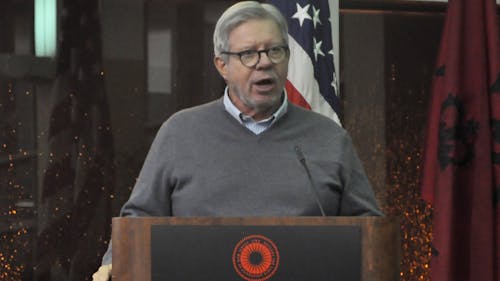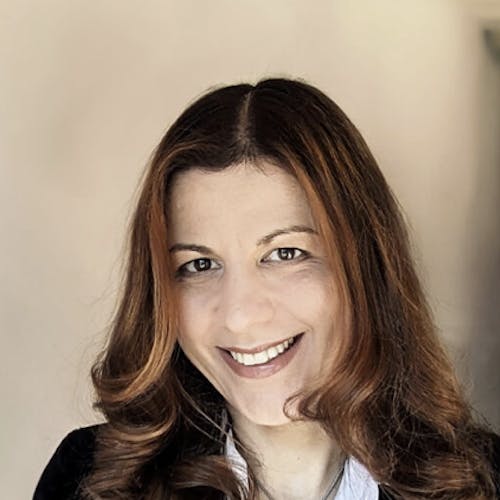Chancellor condemns anti-immigrant messages on campus

Rutgers—New Brunswick Chancellor Richard L. Edwards said Thursday night that students' right to free speech should not lead to derogatory speech.
This was in response to questions at the weekly Rutgers University Student Assembly meeting about the recent chalk graffiti around the College Avenue and Livingston campuses conveying anti-immigrant slogans including "Viva La Deportation" and "Deport Force Coming."
“On one hand, we have freedom of speech and our University promotes that,” Edwards said. “But just because you have the right to say something doesn’t mean it’s right to say."
Edwards said the University walks a fine line between policing free speech and enabling it. Rutgers administrators grapple with these difficult problems on a daily basis.
“Where can we shut down free speech and where is it critically important for us to have it?” Edwards said. "(The University is a place) where we want students to feel safe, where we want students to engage, and not everyone is going to think the way you think in the bigger world.”
The presidential election has exposed the notion that individuals can be as uncivil as they want, Edwards said. Republican nominee Donald Trump kicked off his campaign connecting illegal immigrants with crime, saying, "They're bringing in crime. They're rapists."
Edwards said he “would not be surprised” if the student body sees more of these graffiti incidents in the days to come after the election.
Back in April, before Trump accepted the presidential nominee, pro-Trump chalkings and graffiti appeared on campuses across the United States, including the University of Michigan and University of Connecticut. After Tuesday's incident, the Center for Latino Arts and Culture (CLAC) held a meeting to discuss the anti-immigrant sentiments on campus.
In a statement, faculty members in the Department of Latino and Caribbean Studies said the group was "saddened and appalled by the recent appearance of anti-immigrant graffiti" at Rutgers.
"Although it is clear that the expression of political partisanship is protected and acceptable public speech during a particularly heated presidential election season... we condemn (the markings) in the strongest possible terms," the statement reads.
As one of the most diverse universities in the country, faculty said Rutgers must "stand up to expressions that promote fear, ignorance, and intimidation of our students, staff, faculty, and administrators."
At RUSA's Thursday meeting, campus safety during the night was discussed, with Edwards speaking about working with Rutgers University Police Department Chief Kenneth Cop to install closed-circuit television cameras off-campus and license plate readers in police vehicles by Jan. 1, 2017. The license plate readers will not be used for traffic situations.
Edwards said a group of students were injured during a drive-by shooting over Labor Day weekend in 2015. The students were walking home from a party a little past midnight when the shooting occurred, injuring two of the students.
Helen Park, an Ernest Mario School of Pharmacy first-year student and RUSA member, asked Edwards what the University could do regarding the safety of Cook/Douglass students at night. She said the walk from Lipman Hall to residential areas is not lighted.
Edwards said that he could bring the issue up with Tony Calcado, who heads University Facilities and Capital Planning.
“The safety of all of our students is vitally important,” Edwards said. “The neighborhoods that join our campuses have lots of issues.”
On campus, Rutgers has hired 25 faculty members of color over the last year, Edwards said. This recruitment was made possible by University President Robert L. Barchi's $20 million commitment over a five-year period.
Other diversity initiatives include the Office of Diversity and Inclusion, which was founded last year. The coalition will be publishing a history of diversity at the University from its founding.
On Nov. 10, the 250th anniversary of Rutgers, the University will ring the bell donated by Colonel Henry Rutgers and launch fireworks around 6:00 p.m., Edwards said.
Edwards also answered questions regarding the University’s investments and whether certain affiliated companies are ethically sound. The University Board of Governors and Board of Trustees have a committee on investments, and last year, a group of students worked with administration regarding the divestment of fossil fuels.
The fossil fuel divestment was a success last year, he said.
Two bills were also presented during the night. The first document was the “Bill to Approve the 2016-2017 Special Events Funding” presented by chairperson Michelle Boyland and secretary Joshua Roshal from the allocations board.
The legislation passed, though University senator Viktor Krapivin said the legislation's passage was not a good idea. The assembly serves as a check for the allocations board.
"The assembly does not exist as a rubber stamp for the allocations board," the School of Arts and Sciences junior said.
Ten of the 11 members of the allocations board are not elected, and the result of the vote means the assembly adopted a resolution allocating $119,000 without any formal debate.
The second document presented was the “Bill to Extend the Duration of the Mental Health Task Force” authored by School of Arts and Sciences senior Zachary Sinkiewicz and Krapivin.
The task force is currently in the process of making online appointments possible to make it easier for students to receive treatment from CAPS, Sinkiewicz said. The bill passed with unanimous consent.
Bushra Hasan is a School of Arts and Sciences sophomore majoring in cell biology and neuroscience. She is a correspondent for The Daily Targum. Follow her on Twitter @bushrafhasan for more.



